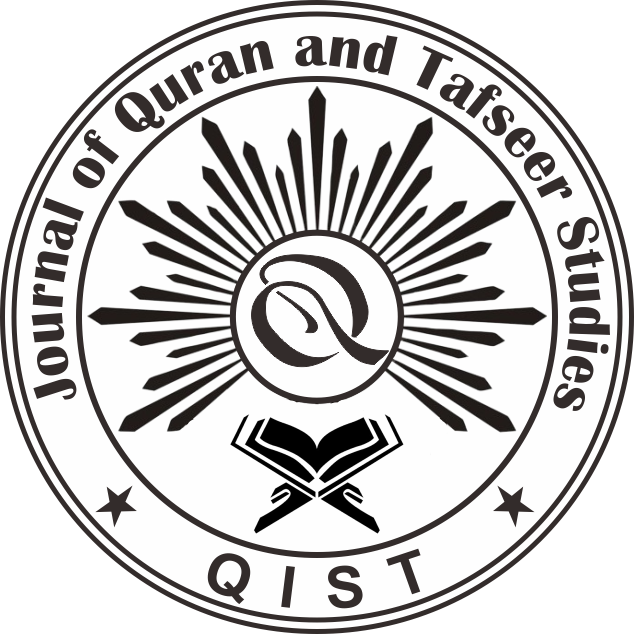THE HERMENEUTICS INFLUENCE ON FEMINIST EXEGESIS: A CASE STUDY ON AMINA WADUD
DOI:
https://doi.org/10.23917/qist.v2i3.2908Keywords:
Amina Wadud's Exegesis, Feminist, HermeneuticAbstract
This article will discuss how hermeneutic influences the exegesis of the Qur’an initiated by Muslim feminists. Through hermeneutical principles, Muslim feminists develop their own theories and methods in presenting new interpretations of the Qur'an. This research will focus its discussion on one of the well-known Muslim feminists, Amina Wadud. Through a critical study of text analysis, this research will try to answer questions about (1) the necessity of using the hermeneutical method in feminist interpretation, (2) the influence of hermeneutics on Amina Wadud's method of interpretation. This paper will highlight this event using a socio-historical approach and content analysis. In addition, references related to the patterns of Islam integrity and culture will be used with a comparative pattern. The conclusion of this research is that through historical critical analysis tools and text criticism inspired by hermeneutical principles, Amina Wadud succeeded in creating her own interpretation method and developing an interpretation approach that is not gender biased and emphasizes the principal and universal messages contained in the Qur'an.
References
S. Mawaddah, "TAKAMMUL: Jurnal Studi Gender dan Islam serta Perlindungan Anak," Takammul J. Studi Gend. Dan Islam Serta Perlindungan Anak, vol. 6, no. 2, pp. 132–151, 2017.
S. Murata, The Tao of Islam, terj. Rahmani Astuti dan MS. Nasrullah. Bandung: Mizan, 1996.
A. Suryorini, "Menelaah Feminisme dalam Islam," vol. 7, no. April, pp. 21–36, 2012.
A. A. Engineer, Hak-Hak Perempuan dalam Islam, terj. Farid Wajidi dan Cicik Farcha Assegaf. Yogyakarta: LSPPA, 1994.
E. Zulaiha, "Tafsir feminis: sejarah, paradigma dan standar validitas tafsir feminis," Al-Bayan J. Studi Al-Qur'an Dan Tafsir, vol. 1, no. 1, pp. 17–26, 2016.
H. F. Anam, "Tafsir Feminisme Islam: Kajian Atas Penafsiran Riffat Hassan terhadap Q.S Al-Nisa [4]: 34," vol. 4, no. 2, pp. 161–176, 2019, doi: 10.24090/maghza.v4i2.3071.
A. Mustaqim, Feminisme dalam Perspektif Riffat Hassan. Yogyakarta: IAIN Sunan Kalijaga, 1999.
A. Wadud, "Towards A Qur'Anic Hermeneutics Of Social Justice : Race , Class And," vol. 12, no. 1, pp. 37–50, 2014.
A. Wadud, Qur'an and Woman Rereading the Sacred Text from a Woman's Perspective. New York: Oxford University Press, 1999.
F. Mernissi, Women and Islam: An Historical and Theological Enquiry. United States: Blackwell Pub, 1991.
A. Setiawan, "Hermeneutika al-Qur'an 'Mazhab Yogya' (Telaah atas Teori Ma'na-Cum-Maghza dalam Penafsiran Al-Qur'an)," J. Studi Ilmu-Ilmu Al-Qur'an Dan Hadis, vol. 17, no. 1, pp. 69–96, 2016.
F. Faiz and A. Usman, 2019. Book. Hermeneutika Al-Quran Teori, Kritik dan Implementasinya. Yogyakarta: Dialektika, 2019.
M. Abdullah, "Kesejarahan al-Qur'an dan Hermeneutika," J. Quran Hadith Stud., vol. 3, no. 1, pp. 57–77, 2014, doi: 10.15408/quhas.v3i1.1163.
A. Barlas, Believing Women in Islam Unreading Patriarchal Interpretations of the Quran. Amerika: University of Texas Press, 2019.
K. Hidayat, Memahami Bahasa Agama. Jakarta: Paramadina, 1996.
F. Esack, Qur'an: Pluralism & Liberation. Oxford: One World, 1997.
Y. F. Rozy and A. Nirwana An, "Penafsiran 'La Taqrabu Al- Zina' Dalam Qs. Al-Isra' Ayat 32 (Studi Komparatif Antara Tafsir Al-Azhar Karya Buya Hamka Dan Tafsir Al-Mishbah Karya M. Quraish Shihab)," QiST J. Quran Tafseer Stud., vol. 1, no. 1, pp. 65–77, Feb. 2022, doi: 10.23917/qist.v1i1.525.
A. Wadud, Inside the Gender Jihad Womens Reform in Islam. 2008.
Downloads
Submitted
Accepted
Published
How to Cite
Issue
Section
License
Copyright (c) 2023 Yahya Fathur Rozy

This work is licensed under a Creative Commons Attribution 4.0 International License.

















